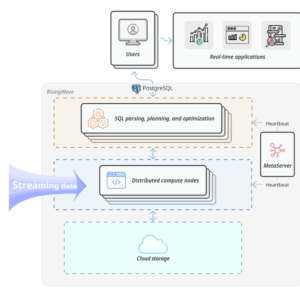

(wanpatsorn/Shutterstock)
Only the most advanced companies have overcome the technical complexity involved with processing streaming data in real time. One of the vendors aiming to reduce this complexity and make stream data processing available to the masses is RisingWave Labs, which today announced $36 million in financing.
The early days of stream data processing brought us stand-alone systems that were capable of acting upon vast streams of data, and doing so with low latency and reliability. Stream processing frameworks like Apache Storm made headway in addressing these challenges and led the way to more sophisticated frameworks like Apache Flink and others.
Things got significantly more complex when companies realized they needed to know something about the past to take the best action on the newest data, which necessitated the integration of stream processing frameworks with databases or data lakes, where the historical record lived as persisted data. Architectural blueprints, such as the Lambda and Kappa architectures, were proposed to address this unique challenge, but the technical complexity in keeping these dual-path systems running are immense.
Today we’re seeing the emergence of a new category of product–the streaming database–aimed at solving this problem. Instead of running data through a dedicated stream processing framework like Storm or Flink, the backers of streaming databases think that all the data processing–including the business end of a streaming big data pipeline like Kafka, Kinesis, or Pulsar–can be handled by the SQL query engine contained in a relational database.

RisingWave is a Postgres-compatible database developed to process data streams in the cloud (Image courtesy RisingWave Labs)
That’s the approach taken with RisingWave, a new open source streaming database that emerged just over a year ago. Yingjun Wu, a former AWS and IBM engineer, created RisingWave as a cloud-native database with the goal of providing the bernefits of stream processing without the technical complexity inherent with stream processing frameworks.
“Existing open-source systems are very costly to deploy, maintain, and use in the modern cloud environment,” Wu, who is the CEO of RisingWave Labs, says in a press release today. “Our goal is not to build yet another streaming system that is 10X faster than existing systems, but to deliver a simple and cost-effective system that allows everyone to benefit from stream processing.”
Developed in Rust, RisingWave is a Postgres-compatible database can do many of the things that stream processing frameworks do, but within the context and control of a familiar relational database running in the cloud and the SQL language, according to Wu, who has a PhD from National University of Singapore and was also a visiting PhD at Carnegie Mellon University.
“[RisingWave] consumes streaming data, performs continuous queries, and maintains results dynamically in the form of a materialized view,” Wu says in a blog post earlier this year. “Processing data streams inside a database is quite different from that inside a stream computation engine: streaming data are instantly ingested into data tables; queries over streaming and historical data are simply modeled as table joins; query results are directly maintained and updated inside the database, without pushing into a downstream system.”
The open source project, which available on GitHub via an Apache 2.0 license, is being adopted by organizations for a range of uses, including real-time analytics and alerting; IoT device tracking; monitoring user activity; and online application data serving. The company, which changed its name from Singularity Data three weeks ago, recently unveiled the beta of a hosted commercial version of RisingWave; it’s slated to become generally available next year.
The $36 million in Series A funding announced today brings the San Francisco company’s total funding to $40 million. That funding will help RisingWave tackle the real-time processing opportunities available in both legacy and green-field applications, says Yu Chen, a partner with Yunqi Partners, which was one of the venture firms that led the Series A.
“There is no lack of tools to process data streams,” Chen states in a press release, “but RisingWave is one of the few designed as a database and can be easily plugged into a modern data stack to make real-time data intelligence a reality.”
Related Items:
Is Real-Time Streaming Finally Taking Off?
Developing Kafka Data Pipelines Just Got Easier
Can Streaming Graphs Clean Up the Data Pipeline Mess?
March 27, 2025
- Marvell Showcases PCIe Gen 6 Optical Interconnect for AI Infrastructure
- Akamai Launches Cloud Inference to Boost AI Workloads at the Edge
- Prophecy Introduces Fully Governed Self-Service Data Preparation for Databricks SQL
- Verdantis Launches Next-Gen AI Solutions to Transform Enterprise Master Data Management
March 26, 2025
- Quest Adds GenAI to Toad to Bridge the Skills Gap in Modern Database Management
- SymphonyAI Expands Industrial AI to the Edge with Microsoft Azure IoT Operations
- New Relic Report Reveals Media and Entertainment Sector Looks to Observability to Drive Adoption of AI
- Databricks and Anthropic Sign Deal to Bring Claude Models to Data Intelligence Platform
- Red Hat Boosts Enterprise AI Across the Hybrid Cloud with Red Hat AI
March 25, 2025
- Cognizant Advances Industry AI with NVIDIA-Powered Agents, Digital Twins, and LLMs
- Grafana Labs Unveils 2025 Observability Survey Findings and Open Source Updates at KubeCon Europe
- Algolia Boosts Browse with AI-Powered Collections
- AWS Expands Amazon Q in QuickSight with New AI Scenarios Capability
- Komprise Automates Complex Unstructured Data Migrations
- PEAK:AIO Chosen by Scan to Support Next-Gen GPUaaS Platform
- Snowflake Ventures Deepens Investment in DataOps.live to Advance Data Engineering Automation
- KX Emerges as Standalone Software Company to Make Temporal AI a Commercial Reality
- PAC Storage Unveils 5000 Series Data Storage Solutions
March 24, 2025
- PayPal Feeds the DL Beast with Huge Vault of Fraud Data
- OpenTelemetry Is Too Complicated, VictoriaMetrics Says
- Accelerating Agentic AI Productivity with Enterprise Frameworks
- When Will Large Vision Models Have Their ChatGPT Moment?
- The Future of AI Agents is Event-Driven
- Your Next Big Job in Tech: AI Engineer
- Data Warehousing for the (AI) Win
- Nvidia Touts Next Generation GPU Superchip and New Photonic Switches
- Alation Aims to Automate Data Management Drudgery with AI
- Can You Afford to Run Agentic AI in the Cloud?
- More Features…
- Clickhouse Acquires HyperDX To Advance Open-Source Observability
- IBM to Buy DataStax for Database, GenAI Capabilities
- NVIDIA GTC 2025: What to Expect From the Ultimate AI Event?
- EDB Says It Tops Oracle, Other Databases in Benchmarks
- Google Launches Data Science Agent for Colab
- Excessive Cloud Spending In the Spotlight
- Databricks Unveils LakeFlow: A Unified and Intelligent Tool for Data Engineering
- Big Data Heads to the Moon
- Weaviate Introduces New Agents to Simplify Complex Data Workflows
- Mathematica Helps Crack Zodiac Killer’s Code
- More News In Brief…
- Gartner Predicts 40% of Generative AI Solutions Will Be Multimodal By 2027
- Snowflake Ventures Invests in Anomalo for Advanced Data Quality Monitoring in the AI Data Cloud
- NVIDIA Unveils AI Data Platform for Accelerated AI Query Workloads in Enterprise Storage
- Accenture Invests in OPAQUE to Advance Confidential AI and Data Solutions
- Qlik Study: 94% of Businesses Boost AI Investment, But Only 21% Have Fully Operationalized It
- Alation Introduces Agentic Platform to Automate Data Management and Governance
- Seagate Unveils IronWolf Pro 24TB Hard Drive for SMBs and Enterprises
- Gartner Identifies Top Trends in Data and Analytics for 2025
- Qlik Survey Finds AI at Risk as Poor Data Quality Undermines Investments
- Palantir and Databricks Announce Strategic Product Partnership to Deliver Secure and Efficient AI to Customers
- More This Just In…



























